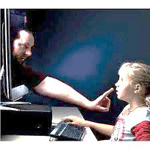ARE YOU BEING HACKED?
COMPUTER hacking is the practise of modifying (changing) computer hardware and software to accomplish a goal outside of the creator’s original purpose.  People who engage in computer hacking activities are often called hackers. Since the word “hack” has long been used to describe someone who is incompetent at his/her profession, some hackers claim this term is offensive, and fails to give appropriate recognition to their skills.
People who engage in computer hacking activities are often called hackers. Since the word “hack” has long been used to describe someone who is incompetent at his/her profession, some hackers claim this term is offensive, and fails to give appropriate recognition to their skills.
Computer hacking is most common among teenagers and young adults, although there are many older hackers as well. Many hackers are true technology buffs who enjoy learning more about how computers work, and consider computer hacking an “art” form. They often enjoy programming, and have expert-level skills in one particular programme. For these individuals, computer hacking is a real-life application of their problem-solving skills; it’s a chance to demonstrate their abilities, not an opportunity to harm others.
Since a large number of hackers are self-taught prodigies (having extraordinary talent or ability), some corporations actually employ computer hackers as part of their technical support staff. These individuals use their skills to find flaws in the company’s security system, so that they can be repaired quickly. In many cases, this type of  computer hacking helps prevent identity theft and other serious computer-related crimes.
computer hacking helps prevent identity theft and other serious computer-related crimes.
Computer hacking can also lead to other constructive technological developments, since many of the skills developed from hacking apply to more mainstream pursuits. For example, former hackers Dennis Ritchie and Ken Thompson went on to create the UNIX operating system in the 1970s. This system had a huge impact on the development of Linux, a free UNIX-like operating system. Shawn Fanning, the creator of Napster, is another hacker well known for his accomplishments outside of computer hacking.
In comparison with those who develop an interest in computer hacking out of simple intellectual curiosity, some hackers have less noble motives. Hackers who are out to steal personal information, change a corporation’s financial data, break security codes to gain unauthorized network access, or conduct other destructive activities are sometimes called “crackers”. This type of computer hacking can earn you a trip to prison.
Signs that you might be ‘HACKED’
• Accounting discrepancies (e.g., someone notices an 18-minute gap in the accounting log in which there is no correlation)
• Unsuccessful logon attempts
• New user accounts of unknown origin
• New files of unknown origin and function
• Unexplained addition, deletion, or modification of data
• System crashes
• Poor system performance: System appears to be slower than normal and less responsive than expected (Note: Unexplained disk activity might be due to disk-related system maintenance, such as disk file clean-up while the system is idle. This is completely normal.)
• Unauthorized operation of a program, or the addition of a sniffer application to capture network traffic or usernames/passwords
• Port Scanning (use of exploit and vulnerability scanners, remote requests for information about systems and/or users, or social engineering attempts)
• Unusual usage times (statistically, more security incidents occur during non-working hours than at any other time)
• An indicated last time of usage of an account that does not correspond to the actual last time of usage for that account
• Unusual usage patterns (e.g., programs are being compiled in the account of a user who does not know how to program)
If you are interested in protecting your home computer against malicious hackers, investing in a good firewall is highly recommended. It’s also a good idea to check your software programs for updates on a regular basis.
The number of really gifted hackers in the world is very small, but there are lots of wannabes. When we do an ethical hack, we could be holding the keys to that company, once we gain access. It’s too great a risk for our customers to be put in a compromising position. With access to so many systems and so much information, the temptation for a former hacker could be too great — like a kid in an unattended candy store.




.png)









